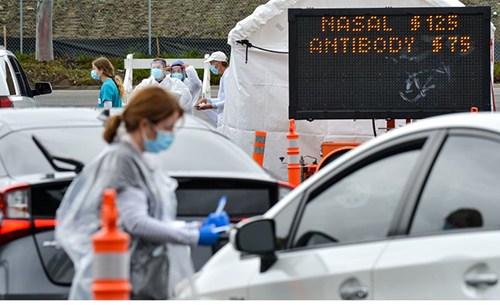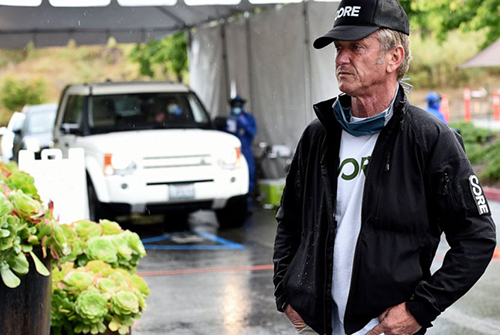Goal of his foundation is to provide access to COVID-19 medical laboratory tests for first responders, as well as low-cost tests to the general public
Early in April, when many of the nation’s clinical laboratories were facing numerous challenges in their attempts to obtain adequate supplies for collecting, transporting, and testing for COVID-19, a Hollywood actor was funding his foundation and obtaining enough supplies for his foundation to offer access to COVID-19 testing to residents in his community of Malibu—as well as in other areas.
In many ways, local medical laboratories that offer COVID-19 tests are competing with actor/philanthropist Sean Penn’s Community Organized Relief Effort (CORE) foundation for the supplies they need to provide COVID-19 testing to the patients in their own communities. The non-profit organization says it is working with various healthcare providers to provide free coronavirus testing to first responders, and low-cost testing to the general public, in eleven cities and counties in California, Georgia, North Carolina, and Illinois.
In fact, the volume of COVID-19 testing CORE currently provides is large enough that The Hollywood Report published a story on June 3, titled, “How Sean Penn Made the Biggest COVID-19 Testing Site in U.S.” The article stated that, “In late May, Mayor Eric Garcetti announced the opening of a new COVID-19 testing site at Dodger Stadium in partnership with CORE, the Los Angeles Dodgers, Live Nation Entertainment, Red Rock Entertainment, and the Los Angeles Fire Department. Operated by CORE and LAFD, this site has capacity to test 6,000 residents a day free of charge––making it three times the size of any other location in L.A. County and said to be the largest testing site in the U.S.”
The Reporter did not make the distinction that the Dodger Stadium site is only collecting specimens. And, no news accounts of the CORE COVID-19 testing program names the clinical laboratories that CORE currently uses to perform the coronavirus tests for the specimens it collects.
CORE Partnered with Private Healthcare Provider Elevated Health
CORE first got underway in 2010 providing disaster relief following the catastrophic magnitude 7.0 earthquake in Haiti. It was known then as the Jenkins-Penn Haitian Relief Organization (J/P HRO). The foundation initiated its support of COVID-19 testing efforts in California in April, reported the Orange County Register (OCR). At that time, testing was much more limited than it is today and drive-thru testing in most areas in America was not available.
In Huntington Beach, Orange County, Calif., CORE partnered with Elevated Health to provide molecular polymerase chain reaction (PCR) tests and serological antibody tests for a fee at a drive-thru location in the city of Westminster, reported the OCR.
Elevated Health’s COVID Clinic website enables consumers to complete pre-test enrollment and payment before arriving at the drive-up testing site at the Westminster Mall.
“Right now, hospitals have very strict guidelines on who can be tested. Public health departments are overwhelmed and possibly underfunded. That’s where I’m trying to bridge the gap,” Matthew Abinante, DO, a doctor of osteopathy and Elevated Health’s founder and CEO, told the OCR.
The coronavirus test kits Elevated Health uses are made in China and were purchased from Georgia-based HealthTrackRx. According to Abinante, they are “FDA authorized, but not FDA approved,” reported the OCR.

CORE Aims to Be a Model for Partnering in Testing
Though CORE’s COVID-19 testing relief efforts are no longer limited to Los Angeles County, that is where it all began. Specimen collection at drive-through sites for COVID-19 tests initially prioritized first responders and essential workers. CORE funds provided for a staff of 70 people at four of the 35 drive-thru specimen collection sites in LA, reported CBS Los Angeles(CBSLA).
CORE-funded services also made it possible for Los Angeles city employees—who were running the drive-thru specimen collection sites—to return to their primary jobs as emergency first responders, reported the Associated Press (AP).
“It’s something that we can adapt to very quickly with the training of the Los Angeles Fire Department initially. And we’re able to take all those firemen and put them back in to serve the people in the way that we need them to,” said Penn in the AP article.
At that time, city officials planned to perform 10,000 tests a day, Deputy Mayor Jeff Gorell, JD, told the LA Times. The City of Los Angeles purchased the tests and CORE covered the cost of staff, volunteers, and personal protective equipment (PPE), reported the LA Times.
“We have servers and people from the Peace Corps, actresses—a lot of people from the communities where the test site is. We’re trying to hire as much locally as possible,” Ann Lee, CORE’s Chief Executive Officer, told Business Insider.
CORE also partnered with the City of Malibu in western Los Angeles County to provide mobile COVID-19 testing services for the city’s 3,000 residents, first responders, and essential workers from April 6 to 17 at a testing site at Malibu City Hall.

Should Drive-Through Testing Continue Post-Pandemic?
An April Dark Daily e-briefing reported on drive-thru COVID-19 specimen collection operations across 30 states. The e-briefing also noted that drive-thru collections protects medical laboratory professionals and emergency department staff from possible exposure to infectious agents.
It’s likely many industries—from education and retail to travel and restaurants—will be revamped as a result of the pandemic. Clinical laboratory leaders and pathologists will want to study the different approaches used to develop drive-through COVID-19 specimen collection; how some providers that ran them partnered with charitable organizations such as CORE; why drive-thru specimen collection appeals to consumers; and how it may improve phlebotomists’ safety and increase clinical laboratory business.
—Donna Marie Pocius
Related Information:
How Sean Penn Made the Biggest COVID-19 Testing Site in U.S.
Private Coronavirus Testing Sites Draw Crowds in Malibu and Westminster
Coronavirus: Mayor Garcetti and Sean Penn of CORE in Partnership
Sean Penn’s Non-Profit Helps Los Angeles, Malibu Expand Testing
Sean Penn Wants to “Save Lives” With Free COVID-19 Testing
Sean Penn’s Nonprofit Boosts COVID-19 Testing Efforts in Los Angeles
Sean Penn Nonprofit, CORE, Provides Coronavirus Testing in Los Angeles




Would like to contribute time on local level